新概念英语第二册期末复习 副词课件(共47张PPT)
文档属性
| 名称 | 新概念英语第二册期末复习 副词课件(共47张PPT) | 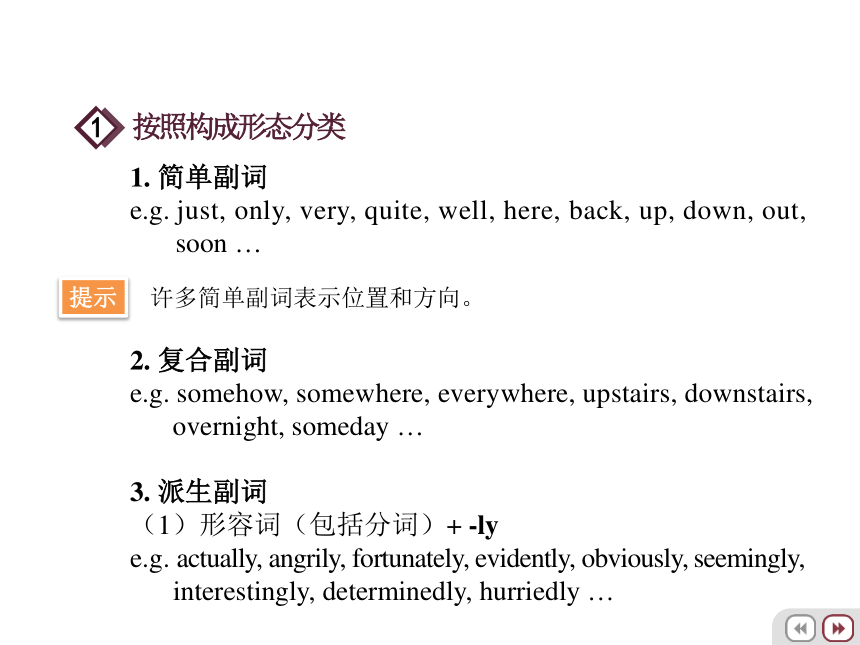 | |
| 格式 | pptx | ||
| 文件大小 | 906.6KB | ||
| 资源类型 | 教案 | ||
| 版本资源 | 新概念英语 | ||
| 科目 | 英语 | ||
| 更新时间 | 2024-11-24 20:14:44 | ||
图片预览

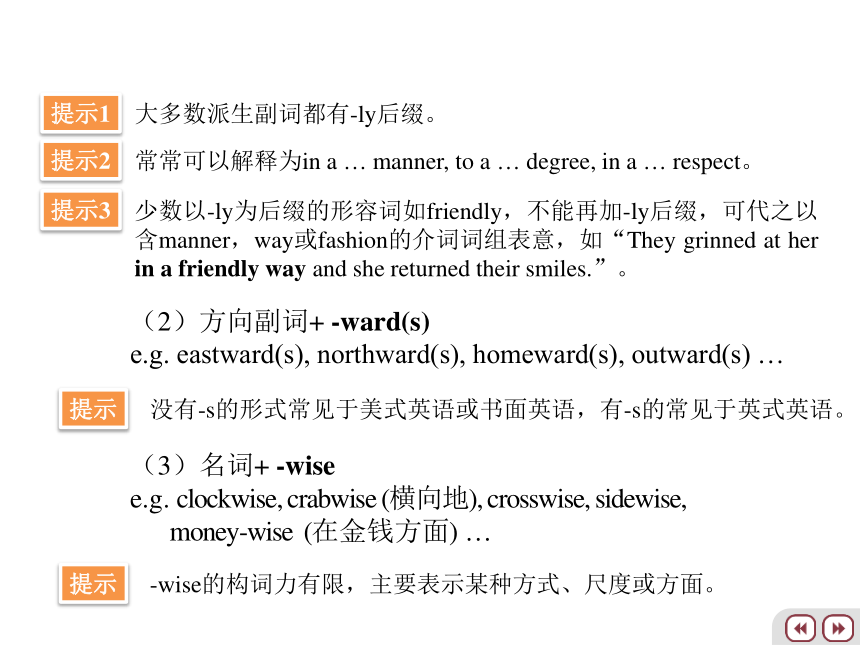

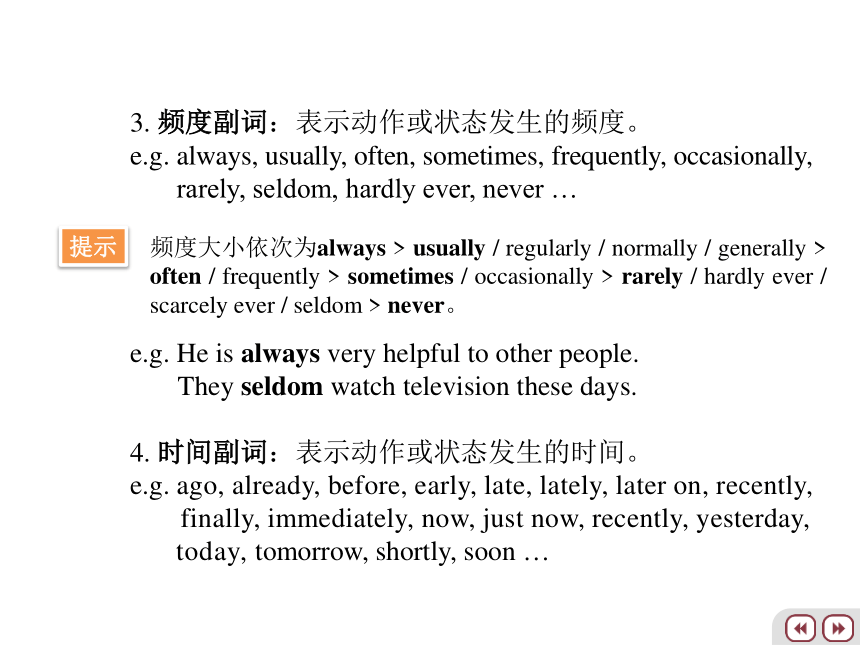
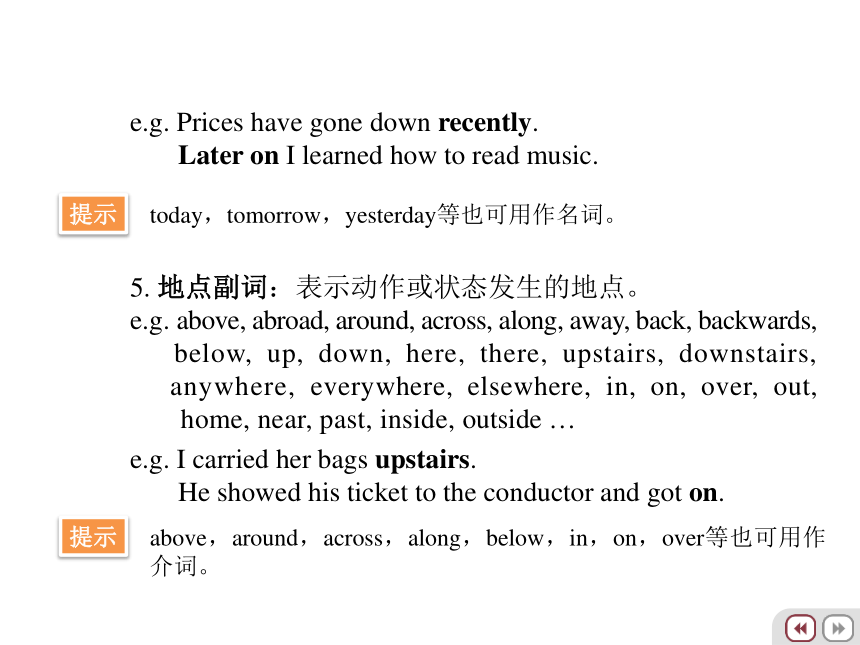

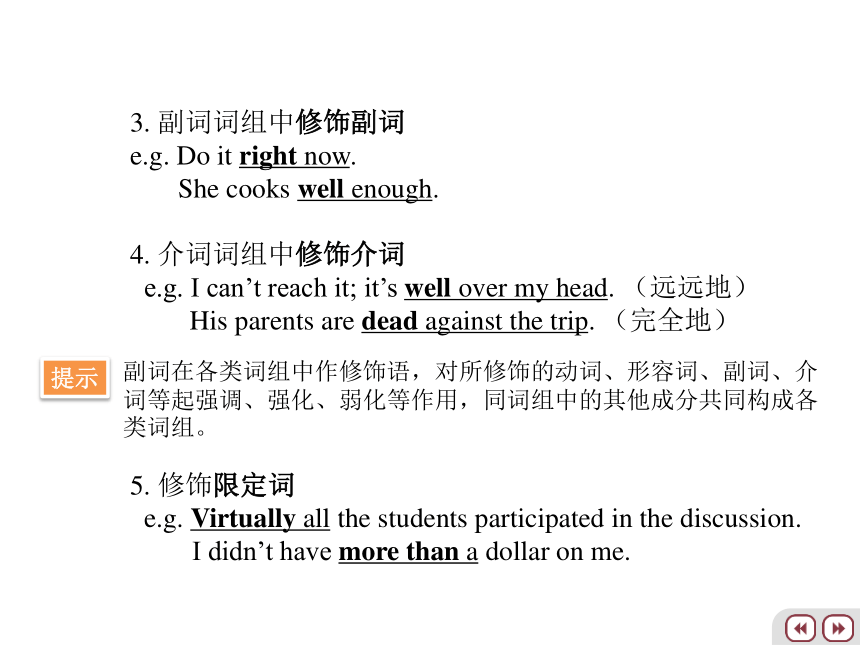




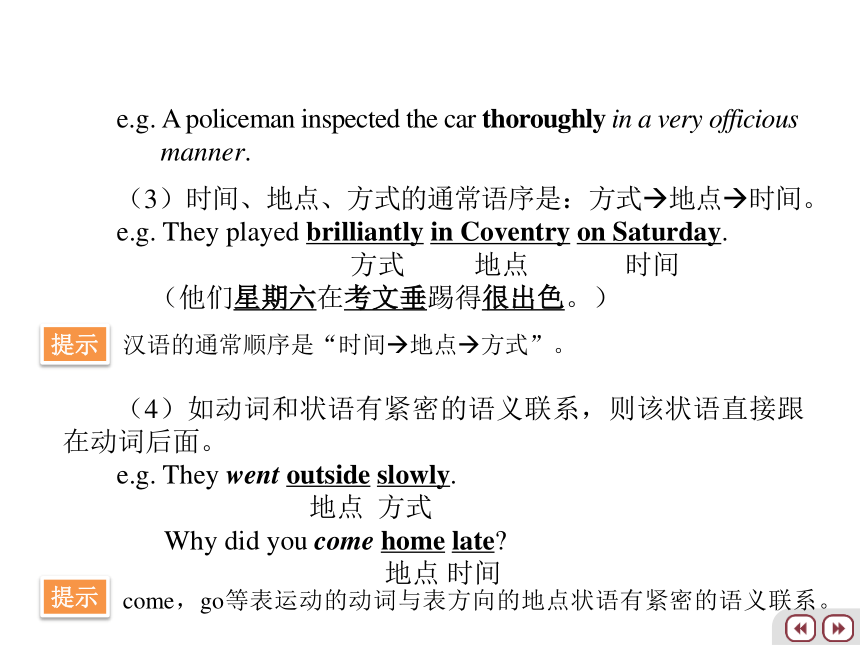
文档简介
(共47张PPT)
1. 简单副词
e.g. just, only, very, quite, well, here, back, up, down, out,
soon …
2. 复合副词
e.g. somehow, somewhere, everywhere, upstairs, downstairs,
overnight, someday …
3. 派生副词
(1)形容词(包括分词)+ -ly
e.g. actually, angrily, fortunately, evidently, obviously, seemingly,
interestingly, determinedly, hurriedly …
按照构成形态分类
1
许多简单副词表示位置和方向。
提示
(2)方向副词+ -ward(s)
e.g. eastward(s), northward(s), homeward(s), outward(s) …
(3)名词+ -wise
e.g. clockwise, crabwise (横向地), crosswise, sidewise,
money-wise (在金钱方面) …
大多数派生副词都有-ly后缀。
常常可以解释为in a … manner, to a … degree, in a … respect。
提示1
提示2
少数以-ly为后缀的形容词如friendly,不能再加-ly后缀,可代之以含manner,way或fashion的介词词组表意,如“They grinned at her in a friendly way and she returned their smiles.”。
提示3
没有-s的形式常见于美式英语或书面英语,有-s的常见于英式英语。
提示
-wise的构词力有限,主要表示某种方式、尺度或方面。
提示
1. 方式副词:表示动作或过程的进行方式。
e.g. angrily, happily, rudely, politely, coldly, warmly, quickly,
slowly, suddenly …
e.g. “Go at once then!” she replied angrily.
Quickly, she jumped to her feet and looked around.
2. 程度副词:表示动作或状态的发展程度。
e.g. almost, awfully, completely, considerably, greatly, nearly, partly, pretty, slightly, hardly, (a) little, much …
e.g. I am awfully glad she isn’t dead. (强化作用)
The traffic was moving pretty slowly. (弱化作用)
按照词汇意义分类
2
方式副词多以-ly结尾,相当于in a…manner / way。
提示
对形容词和副词常起到强化或弱化的作用。
提示
3. 频度副词:表示动作或状态发生的频度。
e.g. always, usually, often, sometimes, frequently, occasionally,
rarely, seldom, hardly ever, never …
e.g. He is always very helpful to other people.
They seldom watch television these days.
4. 时间副词:表示动作或状态发生的时间。
e.g. ago, already, before, early, late, lately, later on, recently,
finally, immediately, now, just now, recently, yesterday,
today, tomorrow, shortly, soon …
频度大小依次为always > usually / regularly / normally / generally > often / frequently > sometimes / occasionally > rarely / hardly ever / scarcely ever / seldom > never。
提示
e.g. Prices have gone down recently.
Later on I learned how to read music.
5. 地点副词:表示动作或状态发生的地点。
e.g. above, abroad, around, across, along, away, back, backwards,
below, up, down, here, there, upstairs, downstairs,
anywhere, everywhere, elsewhere, in, on, over, out,
home, near, past, inside, outside …
e.g. I carried her bags upstairs.
He showed his ticket to the conductor and got on.
today,tomorrow,yesterday等也可用作名词。
提示
above,around,across,along,below,in,on,over等也可用作介词。
提示
1. 动词词组中修饰动词
e.g. They completely ignored my views.
(completely强调ignored的程度)
She kind of hoped to be invited. (= to some extent)
2. 形容词词组中修饰形容词
e.g. Two men were in the street, one of whom seemed slightly
familiar.
I was that hungry I could have eaten a horse. (= so)
副词在词组中作修饰语
1
kind of / sort of在极通俗的口语中可用作副词,意为“在某种程度上”。
提示
that在非正式语体中可作副词,用于强调感情或品质的程度,意为“那样”。
提示
3. 副词词组中修饰副词
e.g. Do it right now.
She cooks well enough.
4. 介词词组中修饰介词
e.g. I can’t reach it; it’s well over my head. (远远地)
His parents are dead against the trip. (完全地)
5. 修饰限定词
e.g. Virtually all the students participated in the discussion.
I didn’t have more than a dollar on me.
副词在各类词组中作修饰语,对所修饰的动词、形容词、副词、介词等起强调、强化、弱化等作用,同词组中的其他成分共同构成各类词组。
提示
6. 修饰名词词组(程度副词quite,rather等)
e.g. That’s quite a story.
She’s rather a fool.
注意:副词在词组中作后置修饰语的两种情况
1. enough,indeed修饰形容词、副词时后置
e.g. This shirt isn’t big enough.
This machine is very good indeed.
2. 有些表示方位和时间的副词作名词修饰语时,习惯上后置
e.g. the sentence below, the weather tomorrow,
your friend here, the meeting yesterday …
作此用法的quite,rather用作强化语,尤其在英式英语中。
提示
意义:表示动作、过程、状态等发生和存在的时间、地点、方式等。
类别:主要由时间副词、地点副词、方式副词等充当。
1. 时间副词词组
位置:句尾、句中、句首
e.g. They had an accident recently.
They recently had an accident.
Recently they had an accident.
The man was taken to a police station. There he was searched
and found to be carrying a quantity of heroin. (衔接上文)
副词词组在句中作修饰性状语
2
置于句首往往与句子的信息结构有关,用以突出强调状语或者衔接上文。
提示
2.方式副词词组
位置:句尾(通常)、句首(有时)
e.g. He always drives carefully.
Suddenly a voice was heard on the loud speaker.
3. 地点副词词组
位置:句尾(通常)、句首(有时)
e.g. The captain told the sailors to go below.
I carried her bags upstairs.
It was warm and comfortable in the little cottage. Outside,
it was getting dark. (对照)
在叙事文中,方式副词可置于句首,以取得制造悬念等戏剧性效果。
提示
置于句首可以表示对照或强调。
提示
4. 句中位置状语的顺序
(1)如有助动词,状语通常紧接其后,或在第一个助动词之后。
e.g. Those kids are always hanging around the streets.
Things will soon be looking up.
(2)紧接在普通动词be之后。
e.g. This camera is definitely faulty.
(3)如有一般时态动词,状语放在动词之前。
e.g. We usually deal with the mail first.
5. 句尾位置状语的顺序
(1)如有宾语,状语通常置于其后。
e.g. I wrapped the parcel carefully.
(2)通常较短的状语放在较长的前面。
e.g. A policeman inspected the car thoroughly in a very officious
manner.
(3)时间、地点、方式的通常语序是:方式 地点 时间。
e.g. They played brilliantly in Coventry on Saturday.
方式 地点 时间
(他们星期六在考文垂踢得很出色。)
(4)如动词和状语有紧密的语义联系,则该状语直接跟在动词后面。
e.g. They went outside slowly.
地点 方式
Why did you come home late
地点 时间
汉语的通常顺序是“时间 地点 方式”。
提示
come,go等表运动的动词与表方向的地点状语有紧密的语义联系。
提示
(5)方式、时间、地点通常位于频率前面。
e.g. Sarah gets up early occasionally.
时间 频率
1. 评注性状语
意义和用法:主要由副词词组充当,修饰整个句子,表示说话人对话语的态度和看法。
位置:常位于句首,并用逗号与句子隔开。
e.g. Unfortunately, the show was one of the dullest we have
ever seen.
Frankly, I’d like to use my brain a little more.
2. 连接性状语
意义和用法:通常由连接副词充当,在分句和分句之间起连接作用。
位置:一般位于句首,也可位于句中。
副词词组在句中作评注性状语和连接性状语
3
有时也可位于句尾和句中。(详见3.2)
提示
e.g. Do it now. Otherwise it will be too late. (句首)
Tom hasn’t arrived yet. He may, however, come later.
(句中)
1. clean / cleanly
clean: completely;entirely “完全地;整个地”
cleanly: precisely;easily;smoothly “准确地;利落地”
e.g. I clean forgot about it.
This knife doesn’t cut cleanly.
2. pretty / prettily
pretty: fairly;moderately “相当地;适当地”
prettily: in a pretty way;attractively “漂亮地,吸引人地”
e.g. She’s pretty good.
Mary dresses prettily.
意义完全不同
1
前者是程度副词,修饰形容词或副词,后者是方式副词,与“漂亮”有关。
提示
3. hard / hardly
hard: with great effort “努力地”
hardly: almost not “几乎不”
e.g. He has been working hard all the morning.
She was so frightened that she could hardly speak.
4. late / lately
late: after the usual time “晚;迟”
lately: recently “最近”
e.g. Ellen has to work late tonight.
I’ve been very busy lately.
前者是方式副词,后者是频度副词,有否定含义。
提示
late是early的反义词。lately不与一般过去时连用,常用于现在完成体。
提示
1. clear / clearly
clear: ① completely; quite “完全地”
② not touching; well away from “不接触;避开”
常见搭配:stand clear of;keep clear of
③ distinctly “清晰地”
常见搭配:loud and clear;shine clear
clearly: without confusion; distinctly; obviously “清晰地;明显地”
e.g. You can see clear to the mountains today.
Stand clear of the gates.
Can you see clearly from here
He is clearly wrong.
部分同义,部分异义
2
clearly用来修饰形容词或动词。
提示
2. close / closely
close: ① near “(时间、空间上)靠近;接近”
② almost “(用于数字前)接近”
closely: ① tightly; thoroughly; carefully “严密地;仔细地”
② to a very great degree “在很大程度上;密切地”
e.g. He lives close to the school.
The total was close to 20% of the workforce.
The prisoners were closely guarded.
I have been closely involved in the work of both committees.
3. dead / deadly
dead: ① completely; suddenly; exactly “完全地;突然地;确实地”
② very; extremely “非常;极度”
deadly: ① horribly; like dead “死一般地”
常见搭配:deadly pale;deadly cold
② extremely “极其;非常”
常见搭配:deadly serious;deadly dull
e.g. You’re dead right.
She stopped dead.
He is dead tired.
His face turned deadly pale.
Life in a small town could be deadly dull.
4. direct / directly
direct: ① without stopping or changing direction “(谈论旅程、路线)直接;径直”
② without involving other people “亲自;直接”
directly: ① in a forthright manner; candidly “直接地;坦率地”
② at once; immediately “立刻;马上”
e.g. We flew direct to Hong Kong.
I prefer to deal with him direct.
She answered me very directly and openly.
She left directly after the show.
5. fair / fairly
fair: according to the rules “按照规则;公正地”
常见搭配:fair and square(光明正大地);play fair(办事公正合理;行为光明磊落);hit fair(按规则出击);fight fair(依照规则开打)
fairly: ① to some extent but not very “一定地;相当地” (修饰形容词和副词)
常见搭配:fairly good / safe / certain / well / soon
② in a fair and reasonable way; honestly “公平合理地;公正地”
常见搭配:fairly and squarely
e.g. They’ll respect you as long as you play fair.
I go jogging fairly regularly.
He has always treated me fairly.
fairly多与褒义的形容词和副词连用。
提示
6. right / rightly
right: ① exactly; directly “正好;恰好;直接地”
② completely; all the way “完全地;一直”
③ immediately “立即;马上”
④ correctly “正确地;确切地”(用于动词之后)
⑤ not left “右边”
rightly: ① for a good reason “正当地;理由充分地” (用于形容词之前)
② correctly “正确地” (用于动词之前)
e.g. You guessed right.
You rightly guessed that she was a nurse.
They are rightly proud of their children.
7. sharp / sharply
sharp: ① exactly “(准时)…整”
② turning suddenly to the left or right “(左/右)急转”
sharply: suddenly and by a large amount “急剧地;突然大幅度地”
e.g. Please be here at eleven o’clock sharp.
At the crossroads we turned sharp to the left.
The road fell sharply to the sea.
1. easy / easily
easy:只在某些固定搭配中作副词
常见搭配:Take it easy. / Easier said than done. / Go easy. / Stand easy. / Easy come, easy go.
easily: without problems or difficulties “容易地”
e.g. They won quite easily.
意义相同,用法不尽相同
3
2. high / highly
high:在某些搭配中用作副词
常见搭配:aim high, hold one’s head high, play high, search high and low, run high, fly high…
highly: ① with admiration or praise “钦佩地;赞赏地”
② very “很;非常”(修饰形容词)
③ at or to a high standard, level or amount “高标准地;高级地;大量地”
e.g. The painter climbed high on the ladder.
If you want to be successful, you have to aim high.
He spoke highly of her.
It’s highly unlikely that she’ll be late.
She’s a highly paid TV presenter.
highly常指抽象的“高”。
提示
3. firm / firmly
firm:在某些搭配中用作副词
常见搭配:stand firm, hold firm to
firmly: in a strong or definite way “坚定地;坚固地”
e.g. She held firm to her principles.
I firmly believe that.
Fix the post firmly in the ground.
4. slow / slowly
slow:美式英语口语;用于交通标志
slowly:正式场合;动词之前;位于句首
e.g. Drive slow!
Slow, dangerous bend!
Then he spoke slowly, but I could not understand him.
She slowly opened the door and went out.
Slowly, he clawed his way out from under the collapsed building.
5. tight / tightly
tight: 非正式语体;常位于动词之后
tightly:正式场合;尤其在-ed分词之前
e.g. She clasped his hand tight in both of hers.
He caught her hand and held it tightly.
The mouth of the jar was tightly sealed.
6. wrong / wrongly
wrong:非正式语体;常位于动词之后
wrongly:较正式语体;动词之前
e.g. You guessed wrong.
The letter was wrongly addressed.
Bottles from this region sell ______ at about $50 a case.
A.
B.
C.
D.
entirely
totally
wholesale
together
该题是副词辨析题。entirely和totally都是“completely(完全地)”的意思;together意为“一起;共同”;作副词用的wholesale意为“以批发方式”,可以与动词sell搭配,符合语境,因此C为正确答案。
本地区的瓶子批发价格为50美元一箱。
Which of the following italicized parts modifies an adverb
A.
B.
C.
D.
Do it right now.
That was a very funny film.
I rather like my teacher.
We walked about 6 miles.
该题考查副词在词组中作修饰语。A句意为“现在马上就做吧”,句中right是副词,修饰时间副词now,因此A为正确答案。B句意为“那是一部非常有趣的电影”,句中副词very修饰形容词funny;C句意为“我倒很喜欢我的老师”,副词rather修饰动词like;D句意为“我们走了大约6英里的路程”,副词about修饰限定词“6”。
下列哪个斜体部分修饰副词?
He feels that he is not yet _______ to travel abroad.
A.
B.
C.
D.
too strong
enough strong
so strong
strong enough
该题考查enough作为副词的用法。enough在用作副词时,通常放在它所修饰的形容词、副词之后,因此D为正确答案。A项too … to结构本身含有否定意思,不能用于否定句;C项so strong后不能接不定式,应该接that-分句。
他感到他的身体还不够强壮,不适于到国外旅游。
The team has been working overtime on the research project ________.
A.
B.
C.
D.
lately
just now
late
long ago
该题考查时间副词及现在完成体的用法。时间副词lately意为“最近;近来”,可用于现在完成体,因此A为正确答案。just now,long ago均为表过去时间的副词词组,不能用于现在完成体。late作为副词意为“迟;晚”,与句意不符。
这个团队最近一直在为这个研究项目加班加点。
Which of the following adverbs can NOT be used to complete “_____ everybody came”
A.
B.
C.
D.
Nearly
Quite
Practically
Almost
该题考查程度副词的辨析。nearly,quite和almost都是表示程度的副词。nearly和almost都可用来修饰不定代词、形容词、副词、动词和介词词组等,此时两者常可互换,而quite除了能修饰形容词、副词、动词、分词外,还能修饰名词、介词词组等,但不能修饰不定代词。practically常用于口语表达中,相当于almost,nearly,可以修饰everybody。因此B为正确答案。
下列哪个副词不能填入句中空格“________ everybody came”?
My daughter has walked eight miles today. We never guessed that she could walk ______ far.
A.
B.
C.
D.
/
such
that
as
该题考查that作为副词修饰形容词的用法。that可用作副词,用于修饰形容词或副词,意为“那么;这么”。该题中that用于修饰形容词far,因此C为正确答案。参见《教程》(P270 b)修饰形容词部分例句。
我女儿今天走了八英里,我们从没有想到她能走那么远。
I arrived at the airport so late that I _________ missed the plane.
A.
B.
C.
D.
only
quite
narrowly
seldom
该题考查副词narrowly的用法。narrowly修饰miss,lose等动词时意为“差一点就…”,其他副词only,quite和seldom均无此意,因此C为正确答案。
我到达机场太晚了以至于差点就错过了飞机。
本讲简单介绍了副词的分类,主要介绍了副词(词组)的主要句法功能,一些兼有两种形式的副词的用法,以及若干易混淆副词的语义辨析。副词包罗万象,类别繁多,是传统词类中最模糊不清、令人困惑的词类。学习中可首先熟悉副词的分类,特别是按其词汇意义的分类。作为词组的组成成分,副词在词组中作修饰语,修饰动词、形容词、副词、介词,除了enough,indeed外,都作前置修饰语,有些地点副词和时间副词能作后置修饰语修饰名词。作为句子成分,副词词组在句中作三种状语:修饰性状语、评注性状语、连接性状语。由于后两种状语是第3讲的主要内容之一,因此本讲可重点关注修饰性状语。修饰性状语的学习要注意各种修饰性状语的位置,先掌握通常的位置,再理解其他位置
可能出于修辞上的需要。兼有两种形式的副词的用法是一个学习难点,学习中可以意义为中心区分为三类:“意义完全不同”、“部分同义,部分异义”、“意义相同,用法不尽相同”,着眼于意义上的差异,抓住主要不同点,如本义和引申义、位置差异、语体不同、常见搭配等来降低学习难度。若干副词之语义辨析部分清晰地介绍了一些易混淆副词在意义和用法上的差异,多数可以从词汇意义上作出区分,有的要考虑位置、语体、频度高低、语势强弱、褒贬色彩、时体结构等。
1.0
2.
0
3.0
4.
The terrain (地形) was explored (scientifically).
The argument (论据) was absurd (scientifically).
He made me angry (thoroughly).
You have studied this chapter (thoroughly).
The terrain was scientifically explored.
/ The terrain was explored scientifically.
Scientifically, the argument was absurd.
/ The argument was absurd, scientifically.
He made me thoroughly angry.
You have thoroughly studied this chapter.
/ You have studied this chapter thoroughly.
5.
0
6.
0
7.0
8.
9.
This is my business (hardly).
I can hear you (hardly).
This is for your ears (only).
This is for your ears (alone).
I spoke to her mother (also).
This is hardly my business. / This hardly is my business.
I can hardly hear you.
This is only for your ears. / This is for your ears only.
This is for your ears alone.
I also spoke to her mother.
/ I spoke also to her mother.
/ Also, I spoke to her mother.
We feel disheartened (sometimes).
Sometimes we feel disheartened.
/ We feel disheartened sometimes.
/ We sometimes feel disheartened.
10.
1.0
2.
3.
4.
5.
6.
Sorry I didn’t turn up — I ________ forgot. (clean, cleanly)
I’m afraid I’m ________ out of food. (clean, cleanly)
This pen writes ________. (clean, cleanly)
Come ________! I want to tell you something. (close, closely)
She’s ________ related to the Duke of Halifax. (close, closely)
The plane goes ________ from London to Houston without stopping. (direct, directly)
clean
clean
cleanly
close
closely
direct
7.
8.
9.
10.
11.
12.
13.
14.
Let’s meet ________ after lunch; then I’ll take you ________ to your room. (direct, directly)
This is a sentence ________ quoted from Latin. (direct, directly)
I’m working too ________ this year. (hard, hardly)
I’ve ________ got any clean clothes left. (hard, hardly)
I ________ recommend it. (high, highly)
He’s very ambitious: he aims ________. (high, highly)
I’m getting ________ fed up. (pretty, prettily)
It serves you ________. (right, rightly)
directly
direct
directly
hard
hardly
highly
high
pretty
right
15.
16.
17.
18.
19.
20.
I ________ assumed that Henry wasn’t coming. (right, rightly)
He opened the door ________. (wide, widely)
I can’t read this. It’s ________ dull. (dead, deadly)
The road is very dangerous. Go ________ slow. (dead, deadly)
Take it ________. (easy, easily)
Always hold ________ to your beliefs. (firm, firmly)
rightly
wide
deadly
dead
easy
firm
John: Have you seen George (1. late / lately)
Tom: No, but I shall see him at Rotherham (2. short / shortly). He has entered for the mile race there. He (3. most / mostly) comes (4. first / firstly) in such races.
John: But he came (5. last / lastly) at Doncaster.
Tom: Yes. That was (6. large / largely) my fault. It was (7. pretty / prettily) hot that day, so I took it (8. easy / easily) on the way to Doncaster. I had (9. clean / cleanly) forgotten that I had promised to pick George up. When I did remember, I (10. quick / quickly) turned round, but I reached George’s house very (11. late / lately). I tried (12. hard / hardly) to drive (13. quick / quickly), but Georg (14. right / rightly) didn’t want me to take risks, and part of the way we were (15. close / closely) followed by a police car, anyway.
表达“(车)开得快”,常用quickly。
rightly通常置于动词之前,意为“正确地”。注意:rightly在句中作评注性状语,参见《教程》P24采取中位的评注性状语部分。
close作副词用时,多指距离上的接近,而closely多用于引申义,意为“紧密地;密切地”。close 通常置于动词之后,但在过去分词之前要用 closely。be closely followed by意为“被…紧紧地跟着”。
表达“近来;最近”,用副词lately(= recently),而副词late意为“迟地;晚地”。
表达“不久;很快”,用副词shortly(= soon),而副词short意为“突然”。
表达“通常;多半地”,用副词mostly,而most意为“最;非常”。
表达“第一;最先”,用副词first,而firstly意为“首先;第一”,用于列举。
表达“在最后”,用副词last,而lastly指顺序上的最后,相当于finally。
表达“主要地”,用副词largely,而large为形容词。
表达“相当地;十分”,用副词pretty,pretty hot意为very hot。
搭配take it easy意为“不慌不忙;从容不迫”。
表达“完全地”,用副词clean,clean forgotten意为“完全忘记”。
quick和quickly均可用作副词,在口语中,一般多用quick(尤其在需要用比较级或最高级时),并且总是放在动词之后,如come quick;若放在动词之前,一般用quickly,文中用在动词之前,需用quickly。
表达“迟地;晚地”,用副词late,reached…very late意为“很晚到达…”。
表达“努力地”,用副词hard,tried hard意为“付出很大努力;费了很大力气”,而hardly为含否定意义的副词,意为“几乎不”。
We went (16. wrong / wrongly) once, at Wakefield, when we turned (17. right / rightly) at some traffic lights, and then we had to go very (18. slow / slowly) for a few miles because the road turned (19. sharp / sharply) every few hundred yards.
When we got to Doncaster, I drove (20. direct / directly) to the race-track and left George there while I went to park somewhere (21. near / nearly). I had cut it so (22. fine / finely) that George had only fifteen minutes before his race, which began at 3:15 (23. sharp / sharply). He had (24. hard / hardly) enough time to get his legs working (25. loose / loosely) again when he had to go to the start, so he was (26. clear / clearly) not in a fit state to win. (27. Sure / Surely) enough, he was beaten (28. easy / easily). However, it is (29. sure / surely) (30. high / highly) unlikely that anything like that will happen again this time!
表达“容易地;轻松地”,用副词easily,可置于动词之后,也可置于过去分词之前。easy作副词和easily 意义相同,但它仅用于某些诸如take it easy,easy does it,stand easy等惯用短语中。
副词surely修饰副词highly,意为“肯定地;无疑”。
表达抽象的“高”,常用副词highly,意为“极;高度地”,highly unlikely意为“极不可能”。
方式副词wrong用于搭配go wrong中,文中相当于went in a wrong way,意为“走错路”。
搭配turn right意为“向右拐”。
两者都可用作副词,但slow通常只与少数动词(如go,drive,pass,climb,run,walk等)连用,且置于其后;而slowly则用法较广,且可置于动词之前或之后,有时还可置于句首。文中用go very slow / slowly皆可。
表达“直线地;不绕圈子地”,用副词direct,drove direct to意为“直接开车到…”。
文中cut it so fine为习惯用语,意为“时间卡得太准了”。fine作副词时常用于口语中,相当于very well,有时也表示“细;小”,而finely意为“不错地;精细地”,可置于动词之后,也可置于过去分词之前。
sharp作副词有punctually(准时地)之意,at 3:15 sharp意为“3点15整”。
hardly为表否定意义的副词,意为“几乎不”,had hardly enough time意为“几乎没有足够的时间”。
表达“松弛地”,用副词loosely,get legs working loosely意为“让腿部放松一下”,而loose主要用作形容词。
表达“明显地”,用副词clearly,相当于obviously。注意:句中的clearly用作评注性状语,同14。而clear作副词用时,作“完全地、径直地;不接触”解。
sure作副词多见于非正式语体,固定搭配sure enough意为“果然;果不其然”。
表达“急剧地”,多用sharply,可置于动词之前或动词之后,还可放在过去分词之前。作副词用的sharp,也含“突然地;急剧地”之意,但多用于口语,仅置于动词之后。
表达“在附近”,用副词near,常用于所修饰词之后,somewhere near = somewhere nearby,而副词nearly = almost意为“几乎”,一般置于被修饰词之前。
1.0
2.0
3.
0
4.
5.
The committee will discuss the matter farther.
Wayne was reported some better today.
He felt fairly tired when he entered the hospital.
The smart dressed women looked out of place in the tavern.
He told immediately Smith to come to the point.
The committee will discuss the matter further.
Wayne was reported somewhat better today.
He felt rather tired when he entered the hospital.
The smartly dressed women looked out of place in the tavern.
He told Smith to come to the point immediately.
6.
7.
8.
9.
10.
The dog crept closely to me.
Late the son has been staying out lately.
He held his bat closely to his chest and then hit the ball highly in the air.
Sit tightly (坚持己见) and don’t be persuaded by him.
Bonds almost has the easiest swing I have ever seen in baseball.
The dog crept close to me.
Lately the son has been staying out late.
He held his bat close to his chest and then hit the ball high in the air.
Sit tight and don’t be persuaded by him.
Bonds has almost the easiest swing I have ever seen in baseball.
1. 简单副词
e.g. just, only, very, quite, well, here, back, up, down, out,
soon …
2. 复合副词
e.g. somehow, somewhere, everywhere, upstairs, downstairs,
overnight, someday …
3. 派生副词
(1)形容词(包括分词)+ -ly
e.g. actually, angrily, fortunately, evidently, obviously, seemingly,
interestingly, determinedly, hurriedly …
按照构成形态分类
1
许多简单副词表示位置和方向。
提示
(2)方向副词+ -ward(s)
e.g. eastward(s), northward(s), homeward(s), outward(s) …
(3)名词+ -wise
e.g. clockwise, crabwise (横向地), crosswise, sidewise,
money-wise (在金钱方面) …
大多数派生副词都有-ly后缀。
常常可以解释为in a … manner, to a … degree, in a … respect。
提示1
提示2
少数以-ly为后缀的形容词如friendly,不能再加-ly后缀,可代之以含manner,way或fashion的介词词组表意,如“They grinned at her in a friendly way and she returned their smiles.”。
提示3
没有-s的形式常见于美式英语或书面英语,有-s的常见于英式英语。
提示
-wise的构词力有限,主要表示某种方式、尺度或方面。
提示
1. 方式副词:表示动作或过程的进行方式。
e.g. angrily, happily, rudely, politely, coldly, warmly, quickly,
slowly, suddenly …
e.g. “Go at once then!” she replied angrily.
Quickly, she jumped to her feet and looked around.
2. 程度副词:表示动作或状态的发展程度。
e.g. almost, awfully, completely, considerably, greatly, nearly, partly, pretty, slightly, hardly, (a) little, much …
e.g. I am awfully glad she isn’t dead. (强化作用)
The traffic was moving pretty slowly. (弱化作用)
按照词汇意义分类
2
方式副词多以-ly结尾,相当于in a…manner / way。
提示
对形容词和副词常起到强化或弱化的作用。
提示
3. 频度副词:表示动作或状态发生的频度。
e.g. always, usually, often, sometimes, frequently, occasionally,
rarely, seldom, hardly ever, never …
e.g. He is always very helpful to other people.
They seldom watch television these days.
4. 时间副词:表示动作或状态发生的时间。
e.g. ago, already, before, early, late, lately, later on, recently,
finally, immediately, now, just now, recently, yesterday,
today, tomorrow, shortly, soon …
频度大小依次为always > usually / regularly / normally / generally > often / frequently > sometimes / occasionally > rarely / hardly ever / scarcely ever / seldom > never。
提示
e.g. Prices have gone down recently.
Later on I learned how to read music.
5. 地点副词:表示动作或状态发生的地点。
e.g. above, abroad, around, across, along, away, back, backwards,
below, up, down, here, there, upstairs, downstairs,
anywhere, everywhere, elsewhere, in, on, over, out,
home, near, past, inside, outside …
e.g. I carried her bags upstairs.
He showed his ticket to the conductor and got on.
today,tomorrow,yesterday等也可用作名词。
提示
above,around,across,along,below,in,on,over等也可用作介词。
提示
1. 动词词组中修饰动词
e.g. They completely ignored my views.
(completely强调ignored的程度)
She kind of hoped to be invited. (= to some extent)
2. 形容词词组中修饰形容词
e.g. Two men were in the street, one of whom seemed slightly
familiar.
I was that hungry I could have eaten a horse. (= so)
副词在词组中作修饰语
1
kind of / sort of在极通俗的口语中可用作副词,意为“在某种程度上”。
提示
that在非正式语体中可作副词,用于强调感情或品质的程度,意为“那样”。
提示
3. 副词词组中修饰副词
e.g. Do it right now.
She cooks well enough.
4. 介词词组中修饰介词
e.g. I can’t reach it; it’s well over my head. (远远地)
His parents are dead against the trip. (完全地)
5. 修饰限定词
e.g. Virtually all the students participated in the discussion.
I didn’t have more than a dollar on me.
副词在各类词组中作修饰语,对所修饰的动词、形容词、副词、介词等起强调、强化、弱化等作用,同词组中的其他成分共同构成各类词组。
提示
6. 修饰名词词组(程度副词quite,rather等)
e.g. That’s quite a story.
She’s rather a fool.
注意:副词在词组中作后置修饰语的两种情况
1. enough,indeed修饰形容词、副词时后置
e.g. This shirt isn’t big enough.
This machine is very good indeed.
2. 有些表示方位和时间的副词作名词修饰语时,习惯上后置
e.g. the sentence below, the weather tomorrow,
your friend here, the meeting yesterday …
作此用法的quite,rather用作强化语,尤其在英式英语中。
提示
意义:表示动作、过程、状态等发生和存在的时间、地点、方式等。
类别:主要由时间副词、地点副词、方式副词等充当。
1. 时间副词词组
位置:句尾、句中、句首
e.g. They had an accident recently.
They recently had an accident.
Recently they had an accident.
The man was taken to a police station. There he was searched
and found to be carrying a quantity of heroin. (衔接上文)
副词词组在句中作修饰性状语
2
置于句首往往与句子的信息结构有关,用以突出强调状语或者衔接上文。
提示
2.方式副词词组
位置:句尾(通常)、句首(有时)
e.g. He always drives carefully.
Suddenly a voice was heard on the loud speaker.
3. 地点副词词组
位置:句尾(通常)、句首(有时)
e.g. The captain told the sailors to go below.
I carried her bags upstairs.
It was warm and comfortable in the little cottage. Outside,
it was getting dark. (对照)
在叙事文中,方式副词可置于句首,以取得制造悬念等戏剧性效果。
提示
置于句首可以表示对照或强调。
提示
4. 句中位置状语的顺序
(1)如有助动词,状语通常紧接其后,或在第一个助动词之后。
e.g. Those kids are always hanging around the streets.
Things will soon be looking up.
(2)紧接在普通动词be之后。
e.g. This camera is definitely faulty.
(3)如有一般时态动词,状语放在动词之前。
e.g. We usually deal with the mail first.
5. 句尾位置状语的顺序
(1)如有宾语,状语通常置于其后。
e.g. I wrapped the parcel carefully.
(2)通常较短的状语放在较长的前面。
e.g. A policeman inspected the car thoroughly in a very officious
manner.
(3)时间、地点、方式的通常语序是:方式 地点 时间。
e.g. They played brilliantly in Coventry on Saturday.
方式 地点 时间
(他们星期六在考文垂踢得很出色。)
(4)如动词和状语有紧密的语义联系,则该状语直接跟在动词后面。
e.g. They went outside slowly.
地点 方式
Why did you come home late
地点 时间
汉语的通常顺序是“时间 地点 方式”。
提示
come,go等表运动的动词与表方向的地点状语有紧密的语义联系。
提示
(5)方式、时间、地点通常位于频率前面。
e.g. Sarah gets up early occasionally.
时间 频率
1. 评注性状语
意义和用法:主要由副词词组充当,修饰整个句子,表示说话人对话语的态度和看法。
位置:常位于句首,并用逗号与句子隔开。
e.g. Unfortunately, the show was one of the dullest we have
ever seen.
Frankly, I’d like to use my brain a little more.
2. 连接性状语
意义和用法:通常由连接副词充当,在分句和分句之间起连接作用。
位置:一般位于句首,也可位于句中。
副词词组在句中作评注性状语和连接性状语
3
有时也可位于句尾和句中。(详见3.2)
提示
e.g. Do it now. Otherwise it will be too late. (句首)
Tom hasn’t arrived yet. He may, however, come later.
(句中)
1. clean / cleanly
clean: completely;entirely “完全地;整个地”
cleanly: precisely;easily;smoothly “准确地;利落地”
e.g. I clean forgot about it.
This knife doesn’t cut cleanly.
2. pretty / prettily
pretty: fairly;moderately “相当地;适当地”
prettily: in a pretty way;attractively “漂亮地,吸引人地”
e.g. She’s pretty good.
Mary dresses prettily.
意义完全不同
1
前者是程度副词,修饰形容词或副词,后者是方式副词,与“漂亮”有关。
提示
3. hard / hardly
hard: with great effort “努力地”
hardly: almost not “几乎不”
e.g. He has been working hard all the morning.
She was so frightened that she could hardly speak.
4. late / lately
late: after the usual time “晚;迟”
lately: recently “最近”
e.g. Ellen has to work late tonight.
I’ve been very busy lately.
前者是方式副词,后者是频度副词,有否定含义。
提示
late是early的反义词。lately不与一般过去时连用,常用于现在完成体。
提示
1. clear / clearly
clear: ① completely; quite “完全地”
② not touching; well away from “不接触;避开”
常见搭配:stand clear of;keep clear of
③ distinctly “清晰地”
常见搭配:loud and clear;shine clear
clearly: without confusion; distinctly; obviously “清晰地;明显地”
e.g. You can see clear to the mountains today.
Stand clear of the gates.
Can you see clearly from here
He is clearly wrong.
部分同义,部分异义
2
clearly用来修饰形容词或动词。
提示
2. close / closely
close: ① near “(时间、空间上)靠近;接近”
② almost “(用于数字前)接近”
closely: ① tightly; thoroughly; carefully “严密地;仔细地”
② to a very great degree “在很大程度上;密切地”
e.g. He lives close to the school.
The total was close to 20% of the workforce.
The prisoners were closely guarded.
I have been closely involved in the work of both committees.
3. dead / deadly
dead: ① completely; suddenly; exactly “完全地;突然地;确实地”
② very; extremely “非常;极度”
deadly: ① horribly; like dead “死一般地”
常见搭配:deadly pale;deadly cold
② extremely “极其;非常”
常见搭配:deadly serious;deadly dull
e.g. You’re dead right.
She stopped dead.
He is dead tired.
His face turned deadly pale.
Life in a small town could be deadly dull.
4. direct / directly
direct: ① without stopping or changing direction “(谈论旅程、路线)直接;径直”
② without involving other people “亲自;直接”
directly: ① in a forthright manner; candidly “直接地;坦率地”
② at once; immediately “立刻;马上”
e.g. We flew direct to Hong Kong.
I prefer to deal with him direct.
She answered me very directly and openly.
She left directly after the show.
5. fair / fairly
fair: according to the rules “按照规则;公正地”
常见搭配:fair and square(光明正大地);play fair(办事公正合理;行为光明磊落);hit fair(按规则出击);fight fair(依照规则开打)
fairly: ① to some extent but not very “一定地;相当地” (修饰形容词和副词)
常见搭配:fairly good / safe / certain / well / soon
② in a fair and reasonable way; honestly “公平合理地;公正地”
常见搭配:fairly and squarely
e.g. They’ll respect you as long as you play fair.
I go jogging fairly regularly.
He has always treated me fairly.
fairly多与褒义的形容词和副词连用。
提示
6. right / rightly
right: ① exactly; directly “正好;恰好;直接地”
② completely; all the way “完全地;一直”
③ immediately “立即;马上”
④ correctly “正确地;确切地”(用于动词之后)
⑤ not left “右边”
rightly: ① for a good reason “正当地;理由充分地” (用于形容词之前)
② correctly “正确地” (用于动词之前)
e.g. You guessed right.
You rightly guessed that she was a nurse.
They are rightly proud of their children.
7. sharp / sharply
sharp: ① exactly “(准时)…整”
② turning suddenly to the left or right “(左/右)急转”
sharply: suddenly and by a large amount “急剧地;突然大幅度地”
e.g. Please be here at eleven o’clock sharp.
At the crossroads we turned sharp to the left.
The road fell sharply to the sea.
1. easy / easily
easy:只在某些固定搭配中作副词
常见搭配:Take it easy. / Easier said than done. / Go easy. / Stand easy. / Easy come, easy go.
easily: without problems or difficulties “容易地”
e.g. They won quite easily.
意义相同,用法不尽相同
3
2. high / highly
high:在某些搭配中用作副词
常见搭配:aim high, hold one’s head high, play high, search high and low, run high, fly high…
highly: ① with admiration or praise “钦佩地;赞赏地”
② very “很;非常”(修饰形容词)
③ at or to a high standard, level or amount “高标准地;高级地;大量地”
e.g. The painter climbed high on the ladder.
If you want to be successful, you have to aim high.
He spoke highly of her.
It’s highly unlikely that she’ll be late.
She’s a highly paid TV presenter.
highly常指抽象的“高”。
提示
3. firm / firmly
firm:在某些搭配中用作副词
常见搭配:stand firm, hold firm to
firmly: in a strong or definite way “坚定地;坚固地”
e.g. She held firm to her principles.
I firmly believe that.
Fix the post firmly in the ground.
4. slow / slowly
slow:美式英语口语;用于交通标志
slowly:正式场合;动词之前;位于句首
e.g. Drive slow!
Slow, dangerous bend!
Then he spoke slowly, but I could not understand him.
She slowly opened the door and went out.
Slowly, he clawed his way out from under the collapsed building.
5. tight / tightly
tight: 非正式语体;常位于动词之后
tightly:正式场合;尤其在-ed分词之前
e.g. She clasped his hand tight in both of hers.
He caught her hand and held it tightly.
The mouth of the jar was tightly sealed.
6. wrong / wrongly
wrong:非正式语体;常位于动词之后
wrongly:较正式语体;动词之前
e.g. You guessed wrong.
The letter was wrongly addressed.
Bottles from this region sell ______ at about $50 a case.
A.
B.
C.
D.
entirely
totally
wholesale
together
该题是副词辨析题。entirely和totally都是“completely(完全地)”的意思;together意为“一起;共同”;作副词用的wholesale意为“以批发方式”,可以与动词sell搭配,符合语境,因此C为正确答案。
本地区的瓶子批发价格为50美元一箱。
Which of the following italicized parts modifies an adverb
A.
B.
C.
D.
Do it right now.
That was a very funny film.
I rather like my teacher.
We walked about 6 miles.
该题考查副词在词组中作修饰语。A句意为“现在马上就做吧”,句中right是副词,修饰时间副词now,因此A为正确答案。B句意为“那是一部非常有趣的电影”,句中副词very修饰形容词funny;C句意为“我倒很喜欢我的老师”,副词rather修饰动词like;D句意为“我们走了大约6英里的路程”,副词about修饰限定词“6”。
下列哪个斜体部分修饰副词?
He feels that he is not yet _______ to travel abroad.
A.
B.
C.
D.
too strong
enough strong
so strong
strong enough
该题考查enough作为副词的用法。enough在用作副词时,通常放在它所修饰的形容词、副词之后,因此D为正确答案。A项too … to结构本身含有否定意思,不能用于否定句;C项so strong后不能接不定式,应该接that-分句。
他感到他的身体还不够强壮,不适于到国外旅游。
The team has been working overtime on the research project ________.
A.
B.
C.
D.
lately
just now
late
long ago
该题考查时间副词及现在完成体的用法。时间副词lately意为“最近;近来”,可用于现在完成体,因此A为正确答案。just now,long ago均为表过去时间的副词词组,不能用于现在完成体。late作为副词意为“迟;晚”,与句意不符。
这个团队最近一直在为这个研究项目加班加点。
Which of the following adverbs can NOT be used to complete “_____ everybody came”
A.
B.
C.
D.
Nearly
Quite
Practically
Almost
该题考查程度副词的辨析。nearly,quite和almost都是表示程度的副词。nearly和almost都可用来修饰不定代词、形容词、副词、动词和介词词组等,此时两者常可互换,而quite除了能修饰形容词、副词、动词、分词外,还能修饰名词、介词词组等,但不能修饰不定代词。practically常用于口语表达中,相当于almost,nearly,可以修饰everybody。因此B为正确答案。
下列哪个副词不能填入句中空格“________ everybody came”?
My daughter has walked eight miles today. We never guessed that she could walk ______ far.
A.
B.
C.
D.
/
such
that
as
该题考查that作为副词修饰形容词的用法。that可用作副词,用于修饰形容词或副词,意为“那么;这么”。该题中that用于修饰形容词far,因此C为正确答案。参见《教程》(P270 b)修饰形容词部分例句。
我女儿今天走了八英里,我们从没有想到她能走那么远。
I arrived at the airport so late that I _________ missed the plane.
A.
B.
C.
D.
only
quite
narrowly
seldom
该题考查副词narrowly的用法。narrowly修饰miss,lose等动词时意为“差一点就…”,其他副词only,quite和seldom均无此意,因此C为正确答案。
我到达机场太晚了以至于差点就错过了飞机。
本讲简单介绍了副词的分类,主要介绍了副词(词组)的主要句法功能,一些兼有两种形式的副词的用法,以及若干易混淆副词的语义辨析。副词包罗万象,类别繁多,是传统词类中最模糊不清、令人困惑的词类。学习中可首先熟悉副词的分类,特别是按其词汇意义的分类。作为词组的组成成分,副词在词组中作修饰语,修饰动词、形容词、副词、介词,除了enough,indeed外,都作前置修饰语,有些地点副词和时间副词能作后置修饰语修饰名词。作为句子成分,副词词组在句中作三种状语:修饰性状语、评注性状语、连接性状语。由于后两种状语是第3讲的主要内容之一,因此本讲可重点关注修饰性状语。修饰性状语的学习要注意各种修饰性状语的位置,先掌握通常的位置,再理解其他位置
可能出于修辞上的需要。兼有两种形式的副词的用法是一个学习难点,学习中可以意义为中心区分为三类:“意义完全不同”、“部分同义,部分异义”、“意义相同,用法不尽相同”,着眼于意义上的差异,抓住主要不同点,如本义和引申义、位置差异、语体不同、常见搭配等来降低学习难度。若干副词之语义辨析部分清晰地介绍了一些易混淆副词在意义和用法上的差异,多数可以从词汇意义上作出区分,有的要考虑位置、语体、频度高低、语势强弱、褒贬色彩、时体结构等。
1.0
2.
0
3.0
4.
The terrain (地形) was explored (scientifically).
The argument (论据) was absurd (scientifically).
He made me angry (thoroughly).
You have studied this chapter (thoroughly).
The terrain was scientifically explored.
/ The terrain was explored scientifically.
Scientifically, the argument was absurd.
/ The argument was absurd, scientifically.
He made me thoroughly angry.
You have thoroughly studied this chapter.
/ You have studied this chapter thoroughly.
5.
0
6.
0
7.0
8.
9.
This is my business (hardly).
I can hear you (hardly).
This is for your ears (only).
This is for your ears (alone).
I spoke to her mother (also).
This is hardly my business. / This hardly is my business.
I can hardly hear you.
This is only for your ears. / This is for your ears only.
This is for your ears alone.
I also spoke to her mother.
/ I spoke also to her mother.
/ Also, I spoke to her mother.
We feel disheartened (sometimes).
Sometimes we feel disheartened.
/ We feel disheartened sometimes.
/ We sometimes feel disheartened.
10.
1.0
2.
3.
4.
5.
6.
Sorry I didn’t turn up — I ________ forgot. (clean, cleanly)
I’m afraid I’m ________ out of food. (clean, cleanly)
This pen writes ________. (clean, cleanly)
Come ________! I want to tell you something. (close, closely)
She’s ________ related to the Duke of Halifax. (close, closely)
The plane goes ________ from London to Houston without stopping. (direct, directly)
clean
clean
cleanly
close
closely
direct
7.
8.
9.
10.
11.
12.
13.
14.
Let’s meet ________ after lunch; then I’ll take you ________ to your room. (direct, directly)
This is a sentence ________ quoted from Latin. (direct, directly)
I’m working too ________ this year. (hard, hardly)
I’ve ________ got any clean clothes left. (hard, hardly)
I ________ recommend it. (high, highly)
He’s very ambitious: he aims ________. (high, highly)
I’m getting ________ fed up. (pretty, prettily)
It serves you ________. (right, rightly)
directly
direct
directly
hard
hardly
highly
high
pretty
right
15.
16.
17.
18.
19.
20.
I ________ assumed that Henry wasn’t coming. (right, rightly)
He opened the door ________. (wide, widely)
I can’t read this. It’s ________ dull. (dead, deadly)
The road is very dangerous. Go ________ slow. (dead, deadly)
Take it ________. (easy, easily)
Always hold ________ to your beliefs. (firm, firmly)
rightly
wide
deadly
dead
easy
firm
John: Have you seen George (1. late / lately)
Tom: No, but I shall see him at Rotherham (2. short / shortly). He has entered for the mile race there. He (3. most / mostly) comes (4. first / firstly) in such races.
John: But he came (5. last / lastly) at Doncaster.
Tom: Yes. That was (6. large / largely) my fault. It was (7. pretty / prettily) hot that day, so I took it (8. easy / easily) on the way to Doncaster. I had (9. clean / cleanly) forgotten that I had promised to pick George up. When I did remember, I (10. quick / quickly) turned round, but I reached George’s house very (11. late / lately). I tried (12. hard / hardly) to drive (13. quick / quickly), but Georg (14. right / rightly) didn’t want me to take risks, and part of the way we were (15. close / closely) followed by a police car, anyway.
表达“(车)开得快”,常用quickly。
rightly通常置于动词之前,意为“正确地”。注意:rightly在句中作评注性状语,参见《教程》P24采取中位的评注性状语部分。
close作副词用时,多指距离上的接近,而closely多用于引申义,意为“紧密地;密切地”。close 通常置于动词之后,但在过去分词之前要用 closely。be closely followed by意为“被…紧紧地跟着”。
表达“近来;最近”,用副词lately(= recently),而副词late意为“迟地;晚地”。
表达“不久;很快”,用副词shortly(= soon),而副词short意为“突然”。
表达“通常;多半地”,用副词mostly,而most意为“最;非常”。
表达“第一;最先”,用副词first,而firstly意为“首先;第一”,用于列举。
表达“在最后”,用副词last,而lastly指顺序上的最后,相当于finally。
表达“主要地”,用副词largely,而large为形容词。
表达“相当地;十分”,用副词pretty,pretty hot意为very hot。
搭配take it easy意为“不慌不忙;从容不迫”。
表达“完全地”,用副词clean,clean forgotten意为“完全忘记”。
quick和quickly均可用作副词,在口语中,一般多用quick(尤其在需要用比较级或最高级时),并且总是放在动词之后,如come quick;若放在动词之前,一般用quickly,文中用在动词之前,需用quickly。
表达“迟地;晚地”,用副词late,reached…very late意为“很晚到达…”。
表达“努力地”,用副词hard,tried hard意为“付出很大努力;费了很大力气”,而hardly为含否定意义的副词,意为“几乎不”。
We went (16. wrong / wrongly) once, at Wakefield, when we turned (17. right / rightly) at some traffic lights, and then we had to go very (18. slow / slowly) for a few miles because the road turned (19. sharp / sharply) every few hundred yards.
When we got to Doncaster, I drove (20. direct / directly) to the race-track and left George there while I went to park somewhere (21. near / nearly). I had cut it so (22. fine / finely) that George had only fifteen minutes before his race, which began at 3:15 (23. sharp / sharply). He had (24. hard / hardly) enough time to get his legs working (25. loose / loosely) again when he had to go to the start, so he was (26. clear / clearly) not in a fit state to win. (27. Sure / Surely) enough, he was beaten (28. easy / easily). However, it is (29. sure / surely) (30. high / highly) unlikely that anything like that will happen again this time!
表达“容易地;轻松地”,用副词easily,可置于动词之后,也可置于过去分词之前。easy作副词和easily 意义相同,但它仅用于某些诸如take it easy,easy does it,stand easy等惯用短语中。
副词surely修饰副词highly,意为“肯定地;无疑”。
表达抽象的“高”,常用副词highly,意为“极;高度地”,highly unlikely意为“极不可能”。
方式副词wrong用于搭配go wrong中,文中相当于went in a wrong way,意为“走错路”。
搭配turn right意为“向右拐”。
两者都可用作副词,但slow通常只与少数动词(如go,drive,pass,climb,run,walk等)连用,且置于其后;而slowly则用法较广,且可置于动词之前或之后,有时还可置于句首。文中用go very slow / slowly皆可。
表达“直线地;不绕圈子地”,用副词direct,drove direct to意为“直接开车到…”。
文中cut it so fine为习惯用语,意为“时间卡得太准了”。fine作副词时常用于口语中,相当于very well,有时也表示“细;小”,而finely意为“不错地;精细地”,可置于动词之后,也可置于过去分词之前。
sharp作副词有punctually(准时地)之意,at 3:15 sharp意为“3点15整”。
hardly为表否定意义的副词,意为“几乎不”,had hardly enough time意为“几乎没有足够的时间”。
表达“松弛地”,用副词loosely,get legs working loosely意为“让腿部放松一下”,而loose主要用作形容词。
表达“明显地”,用副词clearly,相当于obviously。注意:句中的clearly用作评注性状语,同14。而clear作副词用时,作“完全地、径直地;不接触”解。
sure作副词多见于非正式语体,固定搭配sure enough意为“果然;果不其然”。
表达“急剧地”,多用sharply,可置于动词之前或动词之后,还可放在过去分词之前。作副词用的sharp,也含“突然地;急剧地”之意,但多用于口语,仅置于动词之后。
表达“在附近”,用副词near,常用于所修饰词之后,somewhere near = somewhere nearby,而副词nearly = almost意为“几乎”,一般置于被修饰词之前。
1.0
2.0
3.
0
4.
5.
The committee will discuss the matter farther.
Wayne was reported some better today.
He felt fairly tired when he entered the hospital.
The smart dressed women looked out of place in the tavern.
He told immediately Smith to come to the point.
The committee will discuss the matter further.
Wayne was reported somewhat better today.
He felt rather tired when he entered the hospital.
The smartly dressed women looked out of place in the tavern.
He told Smith to come to the point immediately.
6.
7.
8.
9.
10.
The dog crept closely to me.
Late the son has been staying out lately.
He held his bat closely to his chest and then hit the ball highly in the air.
Sit tightly (坚持己见) and don’t be persuaded by him.
Bonds almost has the easiest swing I have ever seen in baseball.
The dog crept close to me.
Lately the son has been staying out late.
He held his bat close to his chest and then hit the ball high in the air.
Sit tight and don’t be persuaded by him.
Bonds has almost the easiest swing I have ever seen in baseball.
同课章节目录
